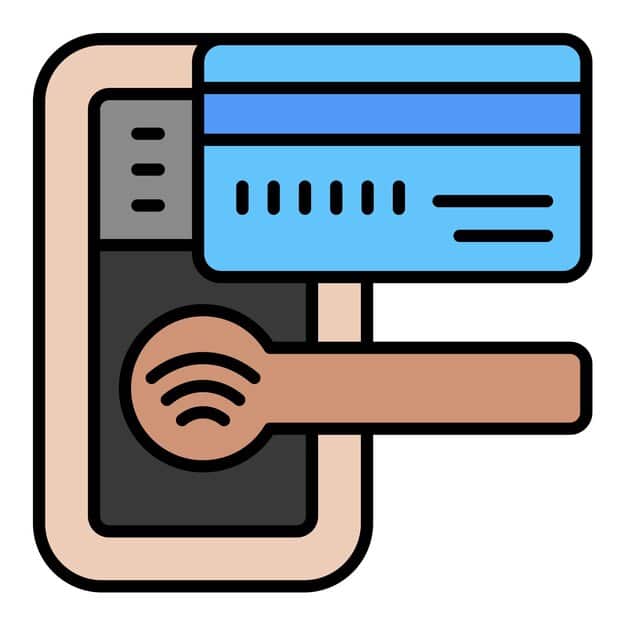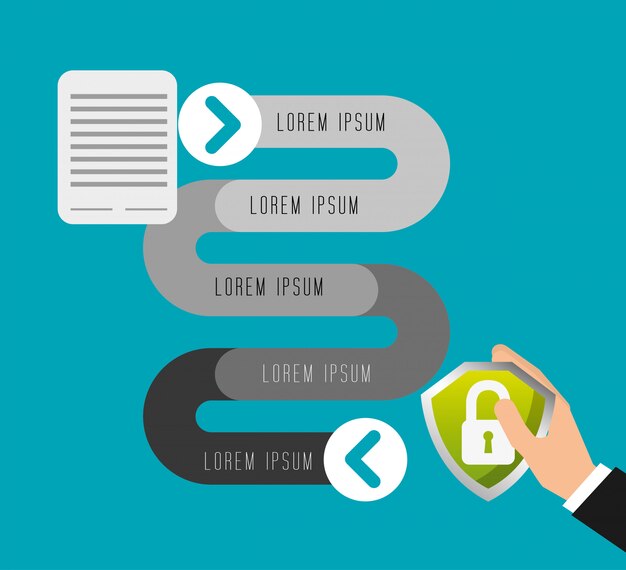Decoding PCI DSS: A Merchant’s Guide to Digital Payment Standards

Decoding the Latest PCI DSS Standards: A Step-by-Step Guide for US Merchants Accepting Digital Payments offers a comprehensive breakdown of the Payment Card Industry Data Security Standard (PCI DSS) to help US merchants understand compliance requirements for secure digital payment processing.
Navigating the world of digital payments can be complex, especially for US merchants trying to comply with security standards. This guide, Decoding the Latest PCI DSS Standards: A Step-by-Step Guide for US Merchants Accepting Digital Payments, provides a practical roadmap for understanding and implementing the Payment Card Industry Data Security Standard (PCI DSS), ensuring your business protects sensitive customer data.
Understanding the PCI DSS Landscape for US Merchants
The Payment Card Industry Data Security Standard (PCI DSS) is a set of security standards designed to protect cardholder data. For US merchants accepting digital payments, understanding PCI DSS is crucial for maintaining customer trust and avoiding costly data breaches. This section offers a broad overview of the PCI DSS landscape and its significance.
What is PCI DSS and Why Does it Matter?
PCI DSS is not a law, but a contractual obligation. Payment brands like Visa, Mastercard, American Express, and Discover require merchants to comply with PCI DSS if they process, store, or transmit cardholder data. Failure to comply can result in fines, increased transaction fees, or even the inability to accept card payments.
Compliance with PCI DSS demonstrates a commitment to data security, protecting both your customers and your business reputation. It also helps to prevent data breaches, which can lead to financial losses, legal liabilities, and reputational damage.
The Key Objectives of PCI DSS
The PCI DSS outlines 12 key requirements organized into six control objectives. These requirements focus on building and maintaining a secure network, protecting cardholder data, maintaining a vulnerability management program, implementing strong access control measures, regularly monitoring and testing networks, and maintaining an information security policy.
- Build and Maintain a Secure Network: Protect your systems from malware and unauthorized access.
- Protect Cardholder Data: Encrypt transmitted data and protect stored data.
- Maintain a Vulnerability Management Program: Regularly update anti-virus software and develop secure systems and applications.
- Implement Strong Access Control Measures: Restrict access to cardholder data on a need-to-know basis.
- Regularly Monitor and Test Networks: Track and monitor all access to network resources and cardholder data.
- Maintain an Information Security Policy: Address information security for all personnel.
Understanding and implementing these objectives is the foundation for achieving and maintaining PCI DSS compliance.
In conclusion, understanding the PCI DSS landscape is paramount for US merchants accepting digital payments. Recognizing its importance, objectives, and requirements sets the stage for building a secure payment environment and ensuring long-term business success.
A Step-by-Step Guide to PCI DSS Compliance
Becoming PCI DSS compliant can seem daunting, but breaking it down into manageable steps simplifies the process. For US merchants, this step-by-step guide provides a clear path toward achieving compliance.
Step 1: Determine Your PCI DSS Compliance Level
Your required level of PCI DSS compliance depends on the number of card transactions your business processes annually. There are four levels, ranging from Level 1 (highest volume of transactions) to Level 4 (lowest volume). The higher the level, the more stringent the requirements and the more frequent the assessments.
Accurately determining your compliance level is essential, as it dictates the scope and frequency of audits and assessments required to demonstrate compliance.
Step 2: Complete a Self-Assessment Questionnaire (SAQ) or On-Site Assessment
Most Level 2, 3, and 4 merchants can validate compliance by completing a Self-Assessment Questionnaire (SAQ). The SAQ is a set of questions designed to assess your business’s compliance with PCI DSS requirements. There are different SAQ types, depending on how your business processes card payments (e.g., online, in-person, over the phone).

Level 1 merchants typically require a more formal on-site assessment conducted by a Qualified Security Assessor (QSA).
Step 3: Remediate Any Identified Vulnerabilities
After completing the SAQ or undergoing an on-site assessment, you’ll need to address any identified vulnerabilities or gaps in your security posture. This might involve implementing new security technologies, updating existing systems, or modifying business processes to meet PCI DSS requirements.
- Implement Security Patches: Regularly update software and operating systems.
- Strengthen Passwords: Enforce strong password policies and multi-factor authentication.
- Secure Your Network: Implement firewalls and intrusion detection systems.
- Encrypt Cardholder Data: Use encryption to protect data in transit and at rest.
Remediation is a critical step. Successfully addressing vulnerabilities is essential for achieving full compliance.
By following this step-by-step guide, US merchants can navigate the complexities of PCI DSS compliance and create a secure payment environment for their customers.
Navigating the 12 PCI DSS Requirements
The PCI DSS comprises 12 requirements that every merchant must meet to ensure the security of cardholder data. Understanding these requirements is pivotal for successful compliance. Let’s delve into each requirement in a practical, actionable manner.
Requirement 1: Install and Maintain a Firewall Configuration to Protect Cardholder Data
A firewall acts as a barrier between your internal network and the outside world, preventing unauthorized access to cardholder data. Properly configuring and maintaining a firewall is paramount, acting as the first line of defense against attacks.
Requirement 2: Do Not Use Vendor-Supplied Defaults for System Passwords and Other Security Parameters
Default passwords and security settings are easily exploited by attackers. Changing these defaults is crucial to securing your systems. Implement strong password policies and regularly review security configurations.
Requirement 3: Protect Stored Cardholder Data
If you store cardholder data, you must protect it with encryption or other appropriate security measures. Minimizing the amount of cardholder data you store is also a best practice. Only store what is absolutely necessary, and purge data when it is no longer needed.
- Encryption: Use strong encryption algorithms to protect stored data.
- Tokenization: Replace sensitive data with non-sensitive tokens.
- Data Masking: Obscure portions of cardholder data to prevent unauthorized access.
Protecting stored cardholder data is a fundamental aspect of PCI DSS compliance. Implement robust measures to safeguard sensitive information.
Requirement 4: Encrypt Transmission of Cardholder Data Across Open, Public Networks
Whenever cardholder data is transmitted across open networks, such as the internet, it must be encrypted to prevent interception. Use secure protocols like Transport Layer Security (TLS) to encrypt data in transit. Also, ensure that your website uses HTTPS to encrypt communication between the user’s browser and your server.
Requirement 5: Protect All Systems Against Malware and Regularly Update Antivirus Software
Malware can compromise your systems and steal cardholder data. Install and maintain antivirus software on all systems that process or store cardholder data. Regularly update the software to protect against the latest threats. Conduct regular scans to detect and remove any malware that may be present.
By meticulously addressing each of these 12 requirements, US merchants can build a comprehensive security framework that protects cardholder data and fosters trust with their customers.
Choosing the Right PCI DSS Validation Method
Selecting the appropriate validation method is a key step toward achieving PCI DSS compliance. The right method depends on your business’s compliance level and how you process card payments. US merchants should carefully evaluate their options.
Self-Assessment Questionnaire (SAQ)
The Self-Assessment Questionnaire (SAQ) is a cost-effective validation method suitable for many Level 2, 3, and 4 merchants. It involves completing a questionnaire that assesses your business’s compliance with specific PCI DSS requirements. Different SAQ types exist to cater to various payment processing scenarios.
Qualified Security Assessor (QSA) On-Site Assessment
Level 1 merchants, and some Level 2 merchants, typically require a formal on-site assessment conducted by a Qualified Security Assessor (QSA). A QSA is a third-party security company that has been certified by the PCI Security Standards Council to perform PCI DSS assessments. During an on-site assessment, the QSA will review your business’s security policies, procedures, and technical controls to determine if they meet PCI DSS requirements.

Internal Security Assessor (ISA)
An ISA is an employee trained by the PCI Security Standards Council to conduct internal PCI DSS assessments. ISAs can help businesses prepare for a QSA assessment or validate compliance for Level 2, 3, and 4 merchants in certain circumstances.
Selecting the Right SAQ Type
Choosing the correct SAQ type can streamline the validation process. Common SAQ types include SAQ A (for merchants using only card-not-present e-commerce transactions), SAQ B (for merchants using only standalone, dial-out terminals), and SAQ C (for merchants with payment application systems connected to the internet).
- SAQ A: For e-commerce merchants who completely outsource their payment processing.
- SAQ B: For merchants using only standalone, dial-out terminals.
- SAQ C: For merchants with payment application systems connected to the internet.
- SAQ P2PE: For merchants using validated Point-to-Point Encryption (P2PE) solutions.
Understanding the nuances of each SAQ type ensures you select the one that accurately reflects your payment processing environment.
By carefully evaluating your validation options and selecting the method that best aligns with your business, US merchants can navigate the PCI DSS compliance process more effectively.
Maintaining PCI DSS Compliance: Ongoing Security
PCI DSS compliance is not a one-time achievement but an ongoing process that requires continuous monitoring and maintenance. US merchants need to integrate security into their daily operations to stay compliant.
Regular Security Assessments and Scans
Conduct regular security assessments and vulnerability scans to identify and address potential security weaknesses. Regularly scheduled assessments ensure that your systems remain secure and compliant with PCI DSS requirements. Furthermore, perform external vulnerability scans at least quarterly.
Employee Training and Awareness
Employees play a crucial role in maintaining PCI DSS compliance. Provide regular training to employees on security best practices, including how to identify phishing attacks, protect passwords, and handle cardholder data securely. Foster a culture of security awareness throughout your organization.
- Phishing Awareness: Train employees to identify and avoid phishing scams.
- Password Security: Enforce strong password policies and multi-factor authentication.
- Data Handling: Educate employees on the proper handling of cardholder data.
Investing in employee training is essential for building a strong security culture.
Incident Response Planning
Develop an incident response plan to address security breaches or data compromises. The plan should outline the steps to take in the event of a security incident, including who to notify, how to contain the breach, and how to restore systems. Regularly test and update the incident response plan.
Staying Updated with PCI DSS Changes
The PCI DSS is updated periodically to address evolving security threats. Stay informed about changes to the standard and update your security policies and procedures accordingly. Subscribe to industry newsletters and participate in PCI SSC webinars to stay current on the latest requirements.
By embracing a continuous improvement mindset and prioritizing ongoing security efforts, US merchants can effectively maintain PCI DSS compliance and safeguard cardholder data.
The Consequences of Non-Compliance
Non-compliance with PCI DSS can have significant consequences for US merchants, ranging from financial penalties to reputational damage. Understanding these potential repercussions is crucial for prioritizing compliance efforts.
Financial Penalties and Fines
Payment brands can impose fines on merchants who fail to comply with PCI DSS. These fines can range from a few thousand dollars to hundreds of thousands of dollars, depending on the severity of the non-compliance and the number of cardholder data records compromised.
Increased Transaction Fees
Non-compliant merchants may be subject to increased transaction fees by their acquiring banks. These fees are intended to offset the increased risk associated with processing payments for merchants who do not meet PCI DSS requirements.
Legal Liabilities
A data breach resulting from PCI DSS non-compliance can expose merchants to legal liabilities. Merchants may be sued by customers whose cardholder data has been compromised. They may also face regulatory investigations and penalties.
- Customer Lawsuits: Customers can sue for damages related to data breaches.
- Regulatory Penalties: Regulatory bodies can impose fines for non-compliance.
- Legal Investigations: Data breaches can trigger legal investigations.
The legal ramifications of PCI DSS non-compliance can be severe.
Reputational Damage
A data breach can severely damage a merchant’s reputation, leading to a loss of customer trust and business. Customers are less likely to do business with a merchant who has experienced a data breach. Negative publicity and social media backlash can further exacerbate the reputational damage.
Termination of Payment Processing Privileges
In severe cases of non-compliance, payment brands may terminate a merchant’s ability to accept card payments altogether. This can be a devastating blow to a business that relies heavily on card payments.
Given the significant consequences of non-compliance, US merchants should prioritize PCI DSS compliance to protect their business and their customers.
| Key Point | Brief Description |
|---|---|
| 🛡️ PCI DSS Overview | Understand the PCI DSS, its objectives, and why it’s crucial for protecting cardholder data. |
| ✅ Compliance Steps | Determine compliance level, complete SAQ, remediate vulnerabilities, and submit attestation. |
| 🔑 12 Requirements | Install firewalls, protect stored data, encrypt transmissions, and maintain security policies. |
| ⚠️ Non-Compliance | Financial penalties, increased fees, legal liabilities, reputational damage, and loss of processing. |
Frequently Asked Questions
▼
The Payment Card Industry Data Security Standard (PCI DSS) is a set of security standards designed to protect cardholder data and reduce fraud. It applies globally to any organization that stores, processes, or transmits cardholder data.
▼
The PCI DSS does not have a set update frequency, but the PCI Security Standards Council releases new versions periodically to address emerging threats, so staying informed about changes is key.
▼
Penalties for non-compliance can include fines, increased transaction fees, lawsuits, termination of payment processing privileges, and reputational damage, varying based on severity and payment brand policies.
▼
PCI DSS is not a law, but a contractual requirement enforced by payment brands. However, some jurisdictions have laws referencing PCI DSS, making compliance effectively mandatory for businesses to operate.
▼
Determine your compliance level based on the number of card transactions your business processes annually. PCI DSS has four levels, each with different requirements for validation and assessment.
Conclusion
As the digital payment landscape evolves, Decoding the Latest PCI DSS Standards: A Step-by-Step Guide for US Merchants Accepting Digital Payments becomes indispensable. This guide equips US merchants with the knowledge to navigate PCI DSS compliance, safeguard customer data, and foster trust in their payment processes, ultimately ensuring business success in an increasingly interconnected world.





